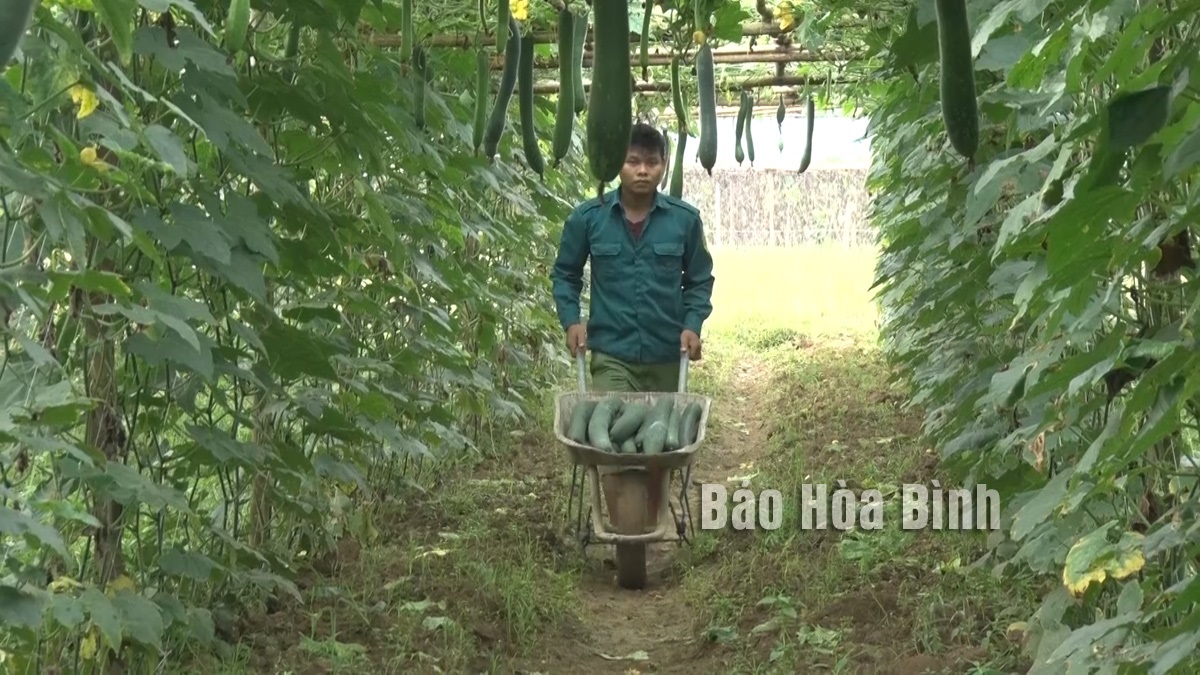
Kim Boi district, Hoa Binh Province focuses on developing safe vegetable production, creating a premise for a clean agriculture.
Growing zucchini brings stable income to people in Du Sang commune, Kim Boi district, Hoa Binh Province.
Du Sang commune is always considered one of the leading communes of Kim Boi district in terms of area and value in producing highly effective crops such as 107 hectares of zucchini for seasonal crops, and 98 hectares of pumpkin for spring crops. Currently, the people of Du Sang commune are affiliated with 4 companies to develop a production chain of growing bitter melon, pumpkin for seeds, growing commercial zucchini... With the orientation of developing economically valuable vegetable crops, the production steering committee of Du Sang commune not only focuses on improving productivity but also improving product quality by helping people apply high-tech production techniques and find stable output for crops.
Mr. Bui Van Thuan, a typical zucchini grower in Du Sang commune, excitedly said: To have good products and protect the health of producers and consumers, we strictly follow the process from soil preparation, choosing varieties, planting, caring, harvesting...
Recently, Kim Boi district has over 210 hectares of production according to VietGAP standards. In the district, zucchini and cucumber growing areas are formed, concentrated in communes: Nam Thuong, Sao Bay, Kim Lap, and Du Sang with an area of about 30 hectares/area; potato growing area in Vinh Dong commune; citrus fruit growing areas in communes: Tu Son, Kim Lap, Vinh Tien, My Hoa, an area of about 100 hectares/commune; maintain 16 production chains with an average income of 50 - 100 million VND/ha/crop.
Mr. Tran Tuan Son, Vice Chairman of Kim Boi District People's Committee, said: The district is determined to develop safe vegetables and fruits to become an important industry. Kim Boi district focuses on many solutions such as: Planning and supporting the development of production areas specializing in safe vegetable cultivation. Convert some ineffective rice land areas to growing vegetables and fruits, especially in localities with favorable transportation and soil conditions. Support communes and towns to consolidate plots and exchange fields to increase the scale of vegetable production, serving the planning of specialized vegetable growing areas. Support the formation of new cooperatives, producer households, and businesses specializing in the production and consumption of safe vegetables; promote trade promotion, brand building, and trademark registration to increase the competitiveness of Kim Boi agricultural products in the market.
Under the blazing early summer sun, the construction site of Nhuan Trach Industrial Park (IP) in Luong Son district is abuzz with activities from dawn to dusk, a testament to the determination of the investor to meet their construction targets on schedule.
In light of the slow disbursement rate of public investment recorded since the beginning of the year, Hoa Binh leaders are stressing the urgent need to identify bottlenecks at each project level and promptly implement targeted solutions to remove obstacles delaying progress.
In May 2025, the total import and export turnover of Hoa Binh Province is estimated to exceed USD 334 million. In which exporting reached nearly USD 196 million, accounting for approximately 40% of the annual target, marking a 17% increase compared to the same period last year. Imports are estimated at nearly 139 million USD, reflecting a 15% growth.
As agriculture increasingly demands professionalism and market adaptability, changing farmers' mindsets from traditional to modern production through science, technology, and skill mastery is key to sustainable development.
During the period 2021 - 2025, Hoa Binh province has been exported over 272.000 tons of agricultural, forestry, and aquatic products, with a total value exceeding 3.266 billion VND. Currently, there are 21 businesses, cooperatives, and cooperative groups in the province with products exported to international markets, including 15 agricultural product facilities and 6 forestry product facilities.



